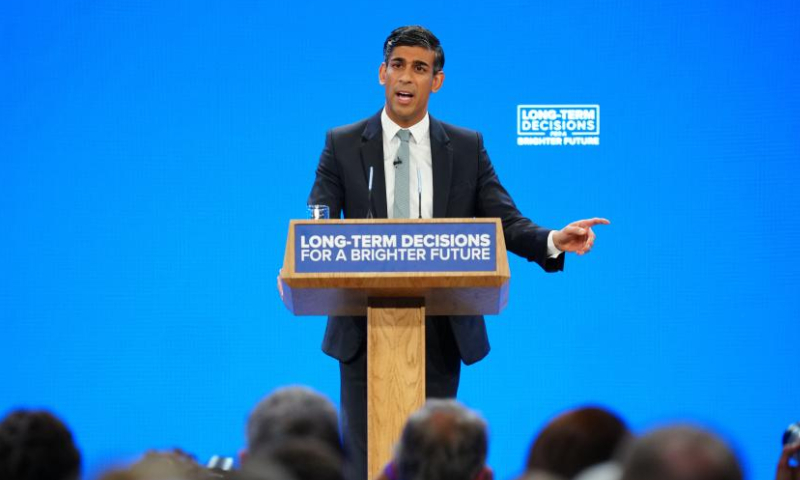
British Prime Minister Rishi Sunak delivers a keynote speech at the Conservative Party's annual conference in Manchester, Britain, on Oct. 4, 2023. United Kingdom (UK) Prime Minister Rishi Sunak vowed on Wednesday to build a "brighter future" for the country as he scrapped the northern leg of the flagship HS2 rail project and introduced a raft of new measures to shore up support for the ruling Conservative Party as the next general election nears. (Xinhua)
United Kingdom (UK) Prime Minister Rishi Sunak vowed on Wednesday to build a "brighter future" for the country as he scrapped the northern leg of the flagship HS2 rail project and introduced a raft of new measures to shore up support for the ruling Conservative Party as the next general election nears.Announcing the decision in a keynote speech at the Conservative Party's annual conference in Manchester, Sunak said that "every single penny" of the 36 billion British pounds (43.7 billion U.S. dollars) saved by scrapping phase two of HS2 will instead be spent on "hundreds and hundreds" of rail, road and transport schemes across the north, Midlands and other parts of the UK.
What had been billed as the country's biggest ever infrastructure project, originally at an estimated total cost of 100 billion pounds, HS2 will now only run between London and Birmingham, the country's second-largest city, while the planned leg between West Midlands and Manchester will be canceled.
In advance of the highly expected confirmation, politicians representing the northern constituencies, as well as northern business leaders, had pleaded with Sunak not to axe phase 2.
Sunak said: "To those who backed the project in the first place, the facts have changed and the right thing to do when the facts change is to have the courage to change direction. And so, I am ending this long-running saga. I am canceling the rest of the HS2 project."
"Those who wish to disagree with me, I respect that, but they should have the honesty to admit that they would now be canceling the hundreds of alternative projects right across the country," he said, challenging his political opponents.
"Our plan will drive far more growth and opportunity here in the north than a faster train to London ever would," the prime minister said.
Reacting to the decision, John Bryson, professor of enterprise and economic geography at the University of Birmingham, told Xinhua that the decision will come to haunt future politicians.
"The problem with major infrastructure investments is that they are costly and time-consuming. The added complication is that the economic returns occur over many decades. Politicians should have the confidence of making what are often eyewatering investments in critical national infrastructure," Bryson said.
"The problem for Sunak is with managing expectations. Too many people are expecting HS2 to unlock regional economies as part of a process that releases waves of leveling up processes that could transform lives," he said.
"Any decision to curtail this investment at Birmingham and to upgrade lines between Birmingham and the northwest, rather than add additional capacity, reflects a poor political compromise. It would also be a compromise that will come to haunt future politicians," he added.
In his speech, Sunak also announced that lawmakers will be given a vote on raising the smoking age by one year, every year. It would mean that a 14-year-old today will never legally be allowed to smoke, and that they and their generation can grow up "smoke-free."
Touting the party's success in controlling illegal immigration, Sunak said small boats crossing the English Channel are for the first time down 20 percent this year. "I will do whatever is necessary to stop the boats," he told the conference.
The prime minister finished his speech by saying: "We will give the country what it so sorely needs, and yet too often has been denied: A government prepared to make long term decisions so that we can build a brighter future for everyone."
Despite Sunak's upbeat messages, the future for the Conservative Party that has been in power for over 13 years is uncertain as the country is mired in a prolonged cost-of-living crisis and its economic recovery since the COVID-19 pandemic has lagged behind most other advanced economies.
The UK has to hold its next general election by the end of January 2025 at the latest. In 2019, when Boris Johnson was the occupant of 10 Downing Street, the Conservatives won a formidable 80-seat majority in the law-making House of Commons.
Opinion polls have all but ruled out a repeat of the landslide of 2019, with the main opposition Labour Party predicted to grab the keys to Downing Street under its leader, Keir Starmer.
